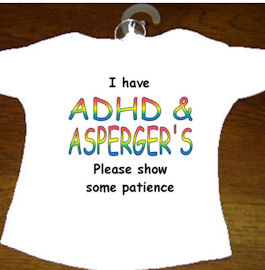Children with Asperger’s
Asperger’s syndrome, a developmental disorder, is often called high-functioning autism. It is classified as an autism spectrum disorder (ASD). Children with ASD, including Asperger’s, tend to have problems with communication and social skills, such as collaborating with other kids in the playground. Communication difficulties can include nonverbal communication. While every child is unique and will present various signs and symptoms of the disorder, those with Asperger’s are generally thought to have a milder form of autism.
Verbal Communication
If your child has Asperger’s syndrome, you may have noticed that he has a delay in speech and language. As he develops speech and language, you may notice other differences between his communication and other children of a similar age group.
Prosody
Prosody refers to the rhythm of spoken language, such as a person’s tone of voice. Your child may use an unusual rate, volume, or rhythm of speech. You may notice that he enunciates his words in a formal manner with little inflection. He may speak loudly in a monotonous voice. He may also have trouble coordinating his speech with his breathing.
Semantics
Semantics refers to the meaning of language or its interpretation. Your child might have a literal understanding of language. Abstract languages might pose challenges for him. He might not understand sarcasm, metaphors, or jokes. He might not understand teasing language.
Pragmatics
One of the most noticeable signs of Asperger’s is the child’s difficulty with pragmatics, or social skills as they apply to language. For example, he may not understand how to take turns in a conversation or how to change topics in a conversation. Your child might frequently interrupt others and fail to use their names. He may be oblivious to the emotional reactions of other people. Children with Asperger’s syndrome also tend to be pedantic speakers. That is, they will overwhelm another person with small details about one particular topic, which often sounds more like a monologue than a reciprocal conversation.
Nonverbal Communication
Your child might also display challenges with nonverbal communication. He may fail to make eye contact when speaking with someone. He may have trouble with properly using and interpreting facial expressions and gestures. Your child might not pick up on social cues from body language. He may maintain awkward or unusual body postures.
These common signs and symptoms typically become more evident as the child enrolls in preschool and is around other children more often. If a teacher or daycare provider informs you that your child seems to be experiencing some communication problems, observe his interactions with his playmates. Talk to your child’s pediatrician and a speech-language pathologist (SLP) about your observations and concerns.






It is true, life becomes more complicated and difficult with Aspergers Syndrome. It is too difficult to be social for a person with Aspergers. But it doesn’t mean that life got finish if any one diagnosed with Aspergers but to live life with better condition, have to make extra efforts.